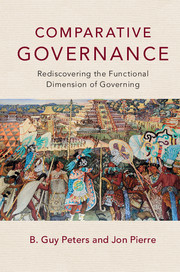Book contents
- Frontmatter
- Contents
- Preface
- 1 The Governance Problem
- 2 The Theory of Governance
- 3 Decision–Making: The Essence of Governing
- 4 Governance and Comparative Politics
- 5 The Institutional Politics of Inter–governmental Relationships
- 6 Implementation, Administration, and Governance
- 7 Governance Failure, Functional Failure, and State Failure
- 8 The Change of Governance and the Governance of Change
- 9 Conclusions: Governance, Functionalism, and Comparative Politics
- References
- Index
9 - Conclusions: Governance, Functionalism, and Comparative Politics
Published online by Cambridge University Press: 05 September 2016
- Frontmatter
- Contents
- Preface
- 1 The Governance Problem
- 2 The Theory of Governance
- 3 Decision–Making: The Essence of Governing
- 4 Governance and Comparative Politics
- 5 The Institutional Politics of Inter–governmental Relationships
- 6 Implementation, Administration, and Governance
- 7 Governance Failure, Functional Failure, and State Failure
- 8 The Change of Governance and the Governance of Change
- 9 Conclusions: Governance, Functionalism, and Comparative Politics
- References
- Index
Summary
The chief purpose of this academic enterprise has been to outline an analytical framework that will provide students of governance with a roadmap into the area of comparative politics. This map should help explain why governance looks different and performs differently in different national contexts. We believe that in doing so we have made contributions both to comparative politics and to governance theory. This approach has allowed us to show how governance theory and comparative politics can be integrated. In addition, by bringing comparative politics research into governance theory, we have been able to shed new light on issues that previous governance scholars may have observed but not pursued at any depth, for instance the multidimensionality of causes of governance failure or change in the configuration of governance arrangements.
Let us briefly recapitulate the main arguments developed in this book. We began (Chapter 1) by rearticulating the role of government in governance and suggested that recent governance research has spent much attention on understanding the involvement of societal actors in governance while ignoring the key actor – the state. While the involvement of social actors certainly is a defining feature of contemporary governance, that observation must not obscure the fact that government, by virtue of significant financial and regulatory powers, remains very much in control (Bell and Hindmoor, 2009). The governance roles accorded societal actors are for the most part roles delegated by government and executed under government scrutiny (Héritier and Rhodes, 2011; Scharpf, 1997).
We then proceeded (Chapters 2 and 3) to outline our theory of governance, drawing on functionalist theory and investigating the role of government and other actors in key governance functions – decision-making, goal-selection, resource mobilization, implementation, and feedback and evaluation. From there, we elaborated different models of governance with regard to differences in the centrality of the state (Chapter 4; see also Pierre and Peters, 2005) and investigated how, and by whom, the functions of governance are delivered in different governance scenarios. Since our main focus in this study is on the state, we then (Chapters 5 and 6) turned our attention inward, into the organization and management of government and the public sector. The two penultimate chapters (Chapters 7 and 8) analyze governance failure from a functionalist theoretical perspective and change in governance, respectively. These two analyses oscillate between an intra-state and state–society perspective.
- Type
- Chapter
- Information
- Comparative GovernanceRediscovering the Functional Dimension of Governing, pp. 214 - 224Publisher: Cambridge University PressPrint publication year: 2016



